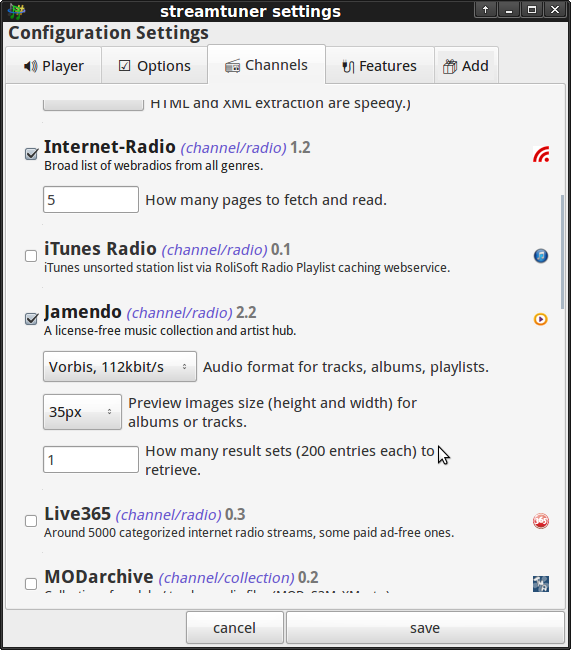Plugin configuration
Project description
Provides plugin basename lookup and meta data extraction functionality. It’s meant for in-application feature and option management. The descriptor format (self-contained in each script) is basically:
# encoding: UTF-8
# api: python
# type: handler
# category: io
# title: Plugin configuration
# description: Read meta data, pyz/package contents, module locating
# version: 0.5
# priority: core
# docs: http://fossil.include-once.org/streamtuner2/wiki/plugin+meta+data
# config: { name: xyz, value: 1, type: bool, description: "Sets..." }
#
# Documentation goes here...
The key: value format is language-agnostic. It’s basically YAML in the topmost script comment. For Python only # hash comments are used. Defaults to rather common field names, encourages a documentation block, and an obvious config: { .. } scheme for options and defaults.
What it’s not:
This is not another config reader/parser/storage class.
Doesn’t impose a specific plugin API.
Neither concerns itself with module/package loading. (How boring.)
What for then?
Separates code from meta data.
Avoids keeping seldomly used descriptors in variables.
Does away with cluttering external ini/json files with each module script.
Prevents hodgepodge and premature module loading just to inspect meta data.
Simplifies both internal use and meta info accessibility to external tools.
pluginconf is less about a concrete implementation/code, but pushing a universal meta data format.
API
Configuration is currently just done through injection:
plugin_base = ["myapp.plugins", "etc.extensions"] module_base = "pluginconf"
Which declares module and plugin basenames. (Works for literal setups and within PYZ applications.)
plugin_meta( module= | fn= | src= | frame= )
Returns a meta data dictionary for the given module name, file, source code, or caller frame.:
{
"title": "Compound★",
"description": "...",
"version": "0.1",
"type": "channel",
"category": "virtual",
...
}
And that’s already what it does.
Everything else is implementation-specific feature creep.
module_list()
Returns basenames of available/installed plugins.
add_plugin_defaults()
Populates your config_options{} and plugin_states{} list. Can be a classic dict, or one of the hundreds of config parser/managers.
get_data( fn= )
Is mostly an alias for pkgutil.get_data(). Abstracts usage within PYZ packages a little.
argparse_map()
Provides a simpler way to specify ugly argparse definitions. And allows to amass options from plugins. Status
GUI

The pluginconf.gui.window() implementation uses PySimpleGUI and is somewhat less pretty and featureful. It doesn’t even attempt to group by categories, and just lists a single pane of settings.
Its main function basically combines plugin lookup and dictionary population after it’s finished:
import pluginconf.gui
config = {
"debug": 0, "verbose": 1, "temp_dir": "/tmp"
}
plugin_states = {
"core": 1, "printing_ui": 0
}
pluginconf.gui.window(config, plugin_states, files=["./library/*.py"])
Where config and plugin_states get updated after invocation. If the GUI is to be used solely for options management, the plugin_states={} param can be left emtpy. (The GUI will still display checkboxes for plugin files, even if they go unused).
Supports only basic option types (bool, str, int, select), no table/dict.
Type casting is somewhat basic (no integer regex).
It’s still up to the application how/where to store the config{} dict (e.g. json.save()).
pluginconf.gui.plugins temporarily holds pre-parsed plugin meta infos after each invocation.
Overall it’s surprisingly short given the PySimpleGUI result set. It would likely behave as well, if e.g. additional tabs or input widgets were added.
Caveats
It’s currently just an excerpt from streamtuner2.
Doesn’t bundle any plugin repo loader logic.
Definitely needs customization prior use.
The GUI implmentation is fairly simplistic.
And doesn’t make use of the dependency class.
The description fields can double as packaging source (setup.py). There’s also a # pack: specifier for fpm (deb/rpm/arch/exe/pyzw/pip generation).
Project details
Release history Release notifications | RSS feed
Download files
Download the file for your platform. If you're not sure which to choose, learn more about installing packages.
Source Distributions
Built Distribution
Hashes for pluginconf-0.7.1-py2.py3-none-any.whl
| Algorithm | Hash digest | |
|---|---|---|
| SHA256 | 71eb989d932f76c4b28901d533bb9a963e7df05dbd1c150c91bc731794cda7e1 |
|
| MD5 | 2e5cb31764ebdda9e3f96fb4e453a07f |
|
| BLAKE2b-256 | 7b9165b6e7486fe873240cc21a5ce27d9a6ff97a5c5acf1998a74b000b8776d6 |











